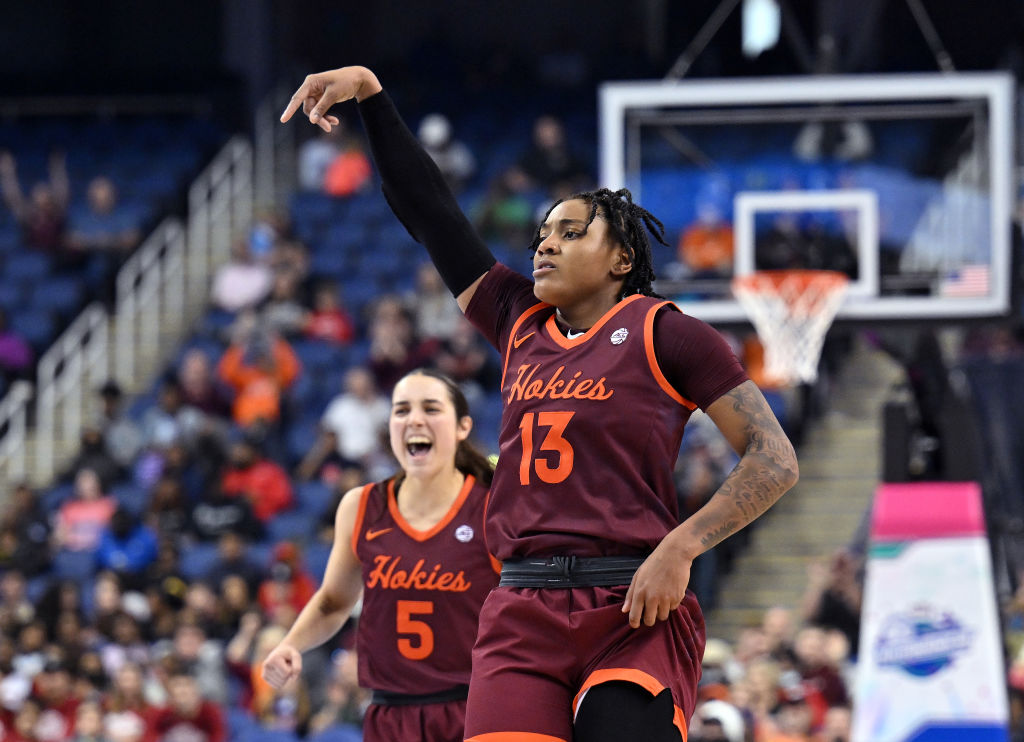Start or finish—which matters more? The third and fourth one-seeds in the women's bracket offer two different answers. Stanford stumbled toward the end of the season and faceplanted in the conference tournament, but survived on the basis of résumé: a regular season Pac-12 title, a tough schedule, plenty of top-50 wins, losing to South Carolina in a more respectable way than anyone else did. Past insulated Stanford from present, but elsewhere in the bracket is a one-seed earned on the basis of momentum.
"Virginia Tech is on an 11-game winning streak, and the way that they've played at the end of the season, and then in their conference tournament, was the reason why they ended up on the one line," Lisa Peterson, chair of the women's selection committee, told ESPN on Sunday night. Under head coach Kenny Brooks, the Virginia Tech Hokies are enjoying their best season in program history, and after winning last weekend's ACC tournament and vaulting up the rankings, they're the hot team of the season. How far can that take them?
The NCAA tournament is nominally about basketball achievement, teamwork, cutting down nets, etc., but really it is about proving points. Its ultimate prize is exculpation. You play the games to win, yes, but also to show that your team and your conference aren't a bunch of fraudulent jokers. The real risk is something worse than losing: It's being exposed. In this battle of agendas, Virginia Tech might be the tournament one-seed with the most at stake. South Carolina, Indiana, Stanford—these other top seeds are regular-season conference champions; two have recent national titles. They've beat their share of fraud allegations. They are articles of faith.
Why believe in Virginia Tech, though? There are plenty of reasons not to. A UConn fan might scoff at the Hokies' easy non-conference schedule. In fact, give the two-seeded Huskies their choice of bracket region and they'd probably be happy to stay where they are. An Iowa fan might turn their nose up at the ACC, which the Hokies didn't even win in the regular season. (They finished third, behind Notre Dame and Duke.) By NET rating, Virginia Tech is only the ninth-best team in the country. They have little roster depth. An analytics nerd will tell you there is no such thing as "momentum" in sports anyway. The prosecution rests its case.
Now for the defense: Virginia Tech's non-conference schedule looked pretty good when it was scheduled—its weakness is the result of bad luck, not cowardice. The Hokies have a 10-2 record against the NET top-25. The team's core of Elizabeth Kitley, Georgia Amoore, and Taylor Soule play a brand of basketball as stylish and in-sync as any other one-seed's offense. Soule, a transfer from Boston College, can't shoot much but plays as if always trying to make up for this failing. She cuts, steals, attacks—she is always trying to do something useful. If I had to cast two college players in a remake of that Kobe-Shaq meme video, I would choose Amoore and Kitley, who seem designed in a lab for each other. Amoore is impetuous, Kitley methodical; the combination is perfect.
Smart play Elizabeth Kitley ( @elizabethkitley ) and Georgia Amoore ( @georgia_amoore ) FOR THREEEEEEEEEEE!!!#ACCWBB pic.twitter.com/NxI3sArRel
— Antonio Garcia (@Iruk_WomenSport) March 4, 2023
Georgia Amoore ( @georgia_amoore ) & Elizabeth Kitley ( @elizabethkitley ) Connection!!!
— Antonio Garcia (@Iruk_WomenSport) January 1, 2023
By the way, what a great assist Georgia Amoore ( @georgia_amoore ) pic.twitter.com/kDZPeuBN43
Doesn't this beautiful, hard-earned chemistry matter? Isn't a team something to be honed and perfected and realized over time? Of course how you finish is more important than how you start! Damn the analytics! Momentum is real! There is a right time to peak, and Virginia Tech has found it. Surely it means something that the Hokies are winning now, that they conquered the tough final part of their conference schedule, that they—what's that? Please stop crying, get down from this table, and accept that they are frauds until proven otherwise? OK, fine.






